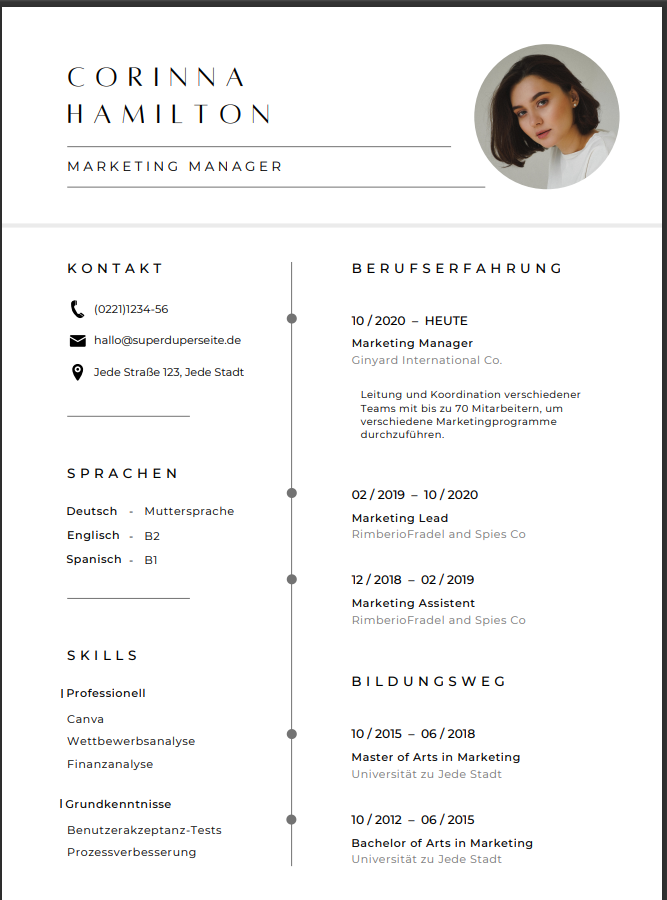How to Write a German CV (Lebenslauf) That’ll Make You Stand Out!
Hey there, Pardesio 🌟
So, you’re ready to dive into the German job market, huh? Exciting! 🙌 But wait – what’s this you hear about writing a Lebenslauf (CV)? And why does it sound so serious? Don’t worry, Leute – I’m here to break it down and make sure you’re nailing that German CV like a pro. Whether you’re fresh off the plane from Pakistan, India, Bangladesh, or anywhere else, let’s make sure your Lebenslauf impresses those German employers from the get-go! 💼
Step 1: What’s a Lebenslauf?
Ah, the famous Lebenslauf – it’s just a fancy German word for your CV or résumé. But, and this is important, in Germany it’s a bit more structured and formal than what you might be used to. No worries though, you’ve got this! It’s all about presenting yourself clearly, professionally, and honestly. 👩💼👨💼
Step 2: Structure It Right – Germans Love Order! 🗂️
Here’s what a standard Lebenslauf should include:
- Personal Information (Persönliche Daten):
- Full name
- Address
- Phone number
- Date of birth (Yes, Germans include this!)
- Nationality (especially relevant for us expats!)
- Professional Photo (Bewerbungsfoto): 📸 Yes, in Germany, they usually expect a photo on your CV. No selfies though! Go for a professional headshot – think polished but approachable. You can get it done at a local photography studio.
- Work Experience (Berufserfahrung): List your work experience in reverse chronological order (most recent first). Include the job title, company, location, and the dates you worked there. Also, add bullet points for your tasks and achievements.
- Education (Ausbildung): Again, reverse chronological order. Mention your degree, the university or school, location, and dates. If you’ve studied at a German university (high five, fellow alumni!), highlight it!
- Skills (Kenntnisse): This section is your time to shine! Mention any languages you speak (German proficiency is a plus), tech skills, or any certifications you’ve picked up.
- Interests (Hobbys): You can mention some personal interests if they’re relevant or show you’re well-rounded (but keep it simple – no need to list every Netflix series you’ve binged!). 🎨⚽
- Signature: Yes, in Germany, you even sign your CV. It shows formality and responsibility. You can add a scanned signature or just write your name.
Step 3: Keep It Brief, But Impactful! 💥
Germans love efficiency (you’ll get used to it!). Your Lebenslauf should be no more than two pages long. It’s not the place to tell your life story – just stick to the relevant facts that will land you that job. Keep it clean, clear, and concise.
Step 4: Customize, Customize, Customize! 📝
Just like tailoring a suit (shoutout to all the Desi tailors who have our backs), you need to tailor your CV for each job you apply for. If you’re applying for a marketing job, highlight those creative projects; if it’s a tech role, emphasize your software skills.
FAQs – Because We’ve Got Questions, Right? 💁🏽♀️
- “Do I really need to include a photo?” In Germany, it’s common, but it’s slowly becoming optional in some sectors. Check the company culture. If in doubt, go with a professional photo.
- “How should I format the CV?” Stick to a simple, professional format. No fancy fonts or rainbow colors. A black-and-white layout is perfect. Keep it readable and professional.
- “Can I write it in English?” If you’re applying to an international company or a role where English is required, it’s fine. But if the job description is in German, the Lebenslauf should be in German too. Deep breath – you can do it!
- “Do I need references?” Not necessarily. In Germany, you don’t typically include references on your CV. But have them ready in case they ask during interviews.
Top Tips to Nail It!
- Don’t exaggerate: German employers value honesty. They don’t want to hear about how you “revolutionized” something if you didn’t.
- Double-check your dates: Germans are sticklers for accuracy, so make sure everything matches up.
- Use action words: Make your experience sound dynamic! Use words like “led,” “developed,” “implemented,” instead of passive phrases.
Handy Links to Help You:
- Europass CV Template: A free, standardized template often used across Europe.
- StepStone: A major job portal in Germany where you can find job openings.
- Make it in Germany: Official site for international professionals moving to Germany.
Final Words about Navigating the German Job Market!
Hey, I know it can feel a bit intimidating to write a German Lebenslauf – especially when it’s your first time. But trust me, once you’ve got the hang of it, it’s smooth sailing! The German job market is all about being clear, concise, and professional, and you’ve already got what it takes. So go ahead, put yourself out there, and land that dream job! 💪
Want More Career Tips?
Stay tuned to my blog for more tips on finding a job, writing cover letters, and generally navigating life in Germany! Subscribe to keep getting that insider info! 🌟

